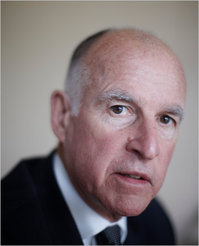Gov. Jerry Brown, fit at 73
Brown's stamina and fitness are noted by adversaries and allies alike. "I hope I'm in that good health when I'm 72," Dutton, the 60-year-old Senate Republican leader, said a few weeks before Brown turned 73. Still, Brown acknowledges he has lost a beat. He is bald, which has the effect of sharpening his already hawklike visage, with bushy white eyebrows and a slight stoop that sometimes makes him look like just another state bureaucrat as he wanders the halls of the Capitol. He has a huskiness of voice and a slight stiffness as he gets in and out of a car. "Oh, yeah, I feel the effects of age," he told me as we sat in his office in March. "You're not as acute as you were when you were younger. There's an aging process that I certainly have experienced. I'm in pretty good shape. And I do know more; there's an accumulation. But there's a big difference between 56 and 72. You do age. There are limits to our lives. They come to an end."
He is compulsive about daily workouts: a three-mile jog along the Sacramento River with Anne or lifting weights in a gym. In an otherwise loosely structured existence, exercise is the one constant on his daily schedule. When the governor ran into Anne at the lunch he attended with Beatty in Oakland, the couple could be overheard engaged in this bit of bantering:
"You look great," Brown said to his wife.
"You look great," Anne responded. "Did you work out today?"
"Yes, I did," Brown said. "Did you work out today?"
"Yes I did," Anne said. At that point, Beatty, who is 74, turned in astonishment to Brown. "You did?" he said. "For how long?"
Brown does push-ups, and he has a chin-up bar in his suite of offices. "I am the one who got him to do pull-ups," Anne said. He lost a belly of weight before his most recent campaign, and Anne is always on him to watch his diet. When a waitress asked Brown during our dinner if he wanted more wine, Anne intervened. "He'll have some water first," she said. Brown, who was picking at bread and French fries, was not on the program. "No, I'll have more wine," he said.
Eighth decade or not, Brown's mental acuity can be imposing. Sharing a turkey sandwich with me and Maureen Dowd, the New York Times Op-Ed columnist, at a hotel meeting room in Anaheim not long ago, Brown started reminiscing about his 1992 campaign for president. "In 1992, I gave a speech in Philadelphia -- which you didn't cover, I remember you were not there," he said, looking at me pointedly. He turned back to Dowd. "Neither were you," he said. Brown not only remembered the year of the first New York Times Magazine profile of him (1975), he remembered who wrote it (Richard Reeves) and the theme of the piece, or at least the way Brown read it (Brown was smart but unlikable).
In some ways, Brown lives as much in his storied past as in the present: in the foyer of his office in March, he pulled out a letter Marshall McLuhan wrote him in 1979, praising one of his speeches. When, more recently, he spoke to the Chamber of Commerce in Los Angeles, the music rose to signal the end of his speech, and Brown started to walk away. But he returned to the microphone to extemporize on the technological trappings before him. "I have to say one more thing: I don't use these teleprompters because I don't believe in them," he said, gesturing at the glass sheets in front of him. He seemed just as put off by the clear plastic lectern. "I also don't like these glass . . . this is kind of like the Academy Awards," he said, before walking off, more Bemused Visitor From Mars than Grumpy Old Man.
...
What seems to fascinate him most is how much his state has changed, a polarization that is as geographic and anthropological as it is political. "The mountain people, the desert people and the farming people have a different view on family, on spending, on social fashions and religion even, when you compare them with the coastal people -- San Francisco and Los Angeles," he said, in a discussion on the differences between Republicans and Democrats. "There are these divergent positions, and when we have to get agreement, that agreement is difficult." He mentioned that his father won many more counties in his re-election campaign of 1962 (against Richard Nixon) than Brown himself just did, even though Brown won a higher percentage of the vote than his father. Brown won 22 counties last November. His father had won 38.
MAGAZINE
Jerry Brown's Last Stand
By ADAM NAGOURNEY
Published: May 4, 2011
The new/old governor is trying to teach Californians a very hard lesson -- that they need government more than they think they do.
